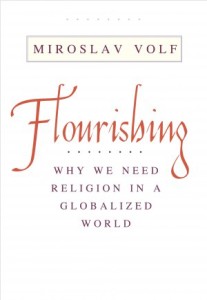My review of Miroslav Volf’s Flourishing is up at TGC. Characteristically for Volf, when it’s good, it’s really, really good . . .
Volf untangles the big bunches of theological threads that have become badly snarled up in the modern church, then weaves them into coherent and very affecting theological tapestries. I was moved by his simple and powerful application of the Great Commandment to globalization, distilling the key questions we need to ask about where globalization is helping or hindering love of God and neighbor.
The introduction also lays out six excellent theses on religion and globalization. Here Volf expresses the enormous possibilities for human flourishing that could come from bringing these forces together, while carefully hedging against the possibility that we might reduce either one into a mere tool of the other. It says something about the state we’re in that merely seeing the key issues set out in this clear and coherent way produces such a sense of relief and appreciation.
. . . and when it’s bad . . .
The most frustrating problem with Flourishing for me is an unresolved conflict at the heart of Volf’s approach to religion and globalization. He sometimes acknowledges the interdependence of religion and globalization; more often, though, he indulges in false narratives that describe globalization as an autonomous force with no moral origin or end (telos).
The most shocking instance is when he holds up a set of passages from the Communist Manifesto as describing globalization “better than anyone before . . . and, for at least a century, better than anyone after” (29). He apparently doesn’t see how the rejection of God and the seeds of mass murder—the reduction of human beings to mere tools of class interests, the dehumanization of the “bourgeois,” the materialistic understanding of economic desires, and the assertion of a basic opposition between economics and religion—are represented in the very passages he praises so highly.
My takeaway? “You can only reform what you love.”
